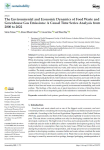Yilmaz S., Günal A.M., Köse G., Bas M. (2025). The environmental and economic dynamics of food waste and greenhouse gas emissions: a causal time series analysis from 2000 to 2022. Sustainability, 01/01/2025, vol. 17, n. 2, p. 775.
https://doi.org/10.3390/su17020775
https://doi.org/10.3390/su17020775
| Titre : | The environmental and economic dynamics of food waste and greenhouse gas emissions: a causal time series analysis from 2000 to 2022 (2025) |
| Auteurs : | S. Yilmaz ; A.M. Günal ; G. Köse ; M. Bas |
| Type de document : | Article |
| Dans : | Sustainability (vol. 17, n. 2, January 2025) |
| Article en page(s) : | p. 775 |
| Langues : | Anglais |
| Langues du résumé : | Anglais |
| Catégories : |
Catégories principales 08 - ALIMENTATION ; 8.3 - Politique et Sécurité AlimentaireThésaurus IAMM GASPILLAGE ALIMENTAIRE ; SYSTEME AGROALIMENTAIRE ; SYSTEME ALIMENTAIRE ALTERNATIF ; DURABILITE ; GAZ A EFFET DE SERRE |
| Résumé : | Food loss and waste pose significant social, economic, and environmental challenges worldwide, threatening food security and hindering sustainable development. While developing countries primarily face losses during production and storage, developed nations struggle with waste driven by consumer habits, spoilage, and overstocking, particularly in markets, restaurants, and homes. This study was aimed to analyze the complex relationships between food loss, waste, and various economic and environmental variables. The study examined the effects of variables such as education expenditures, food security, food prices, greenhouse gas emissions, and carbon emissions per capita on food losses and waste. These analyses shed light on the development of sustainable food policies at both national and global levels. Interventions to reduce food loss and waste will not only optimize food production and consumption processes but will also support a sustainable management of resources. As a result, this study aimed to understand the long-term effects of food loss and waste on economic growth, environmental sustainability, and social welfare. The findings of the study are of great importance in terms of directing future policies and aim to be an important guide in the transition to sustainable food systems. |
| Cote : | En ligne |
| URL / DOI : | https://doi.org/10.3390/su17020775 |







